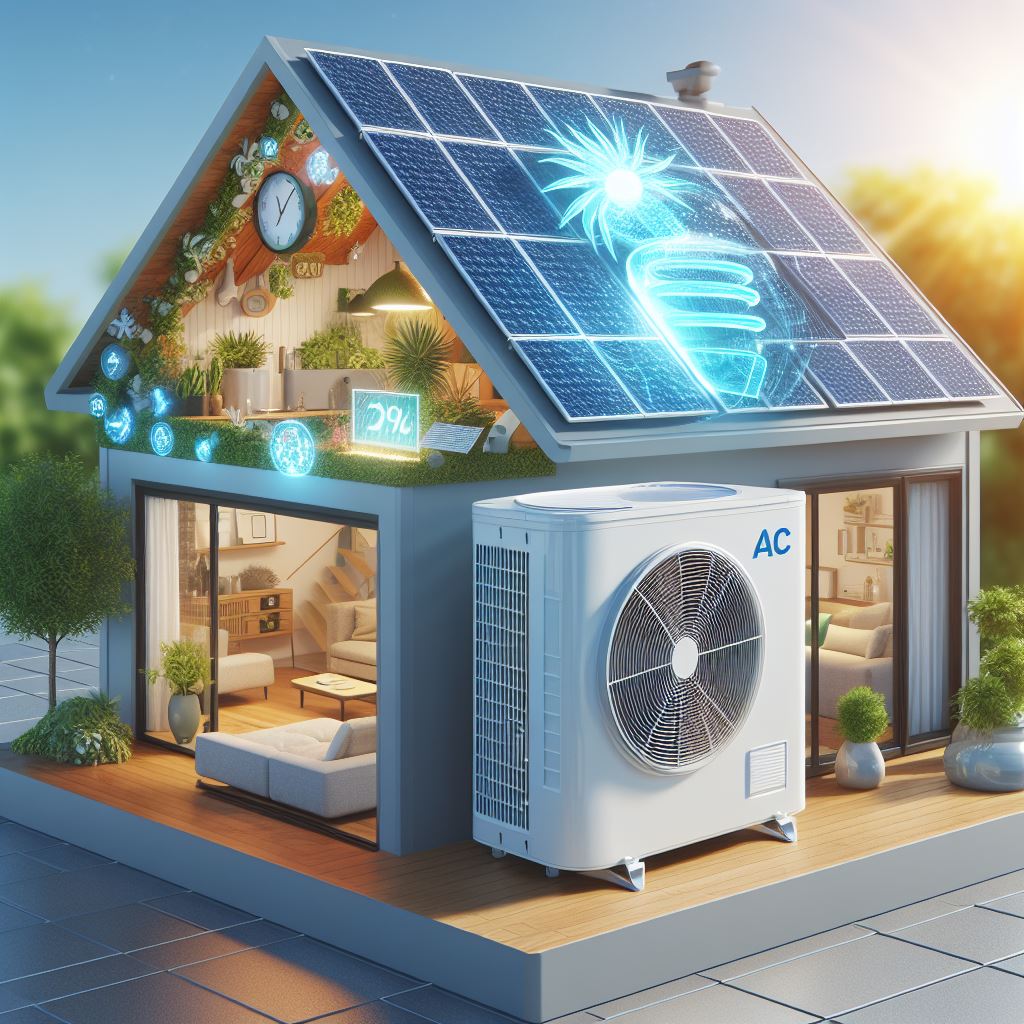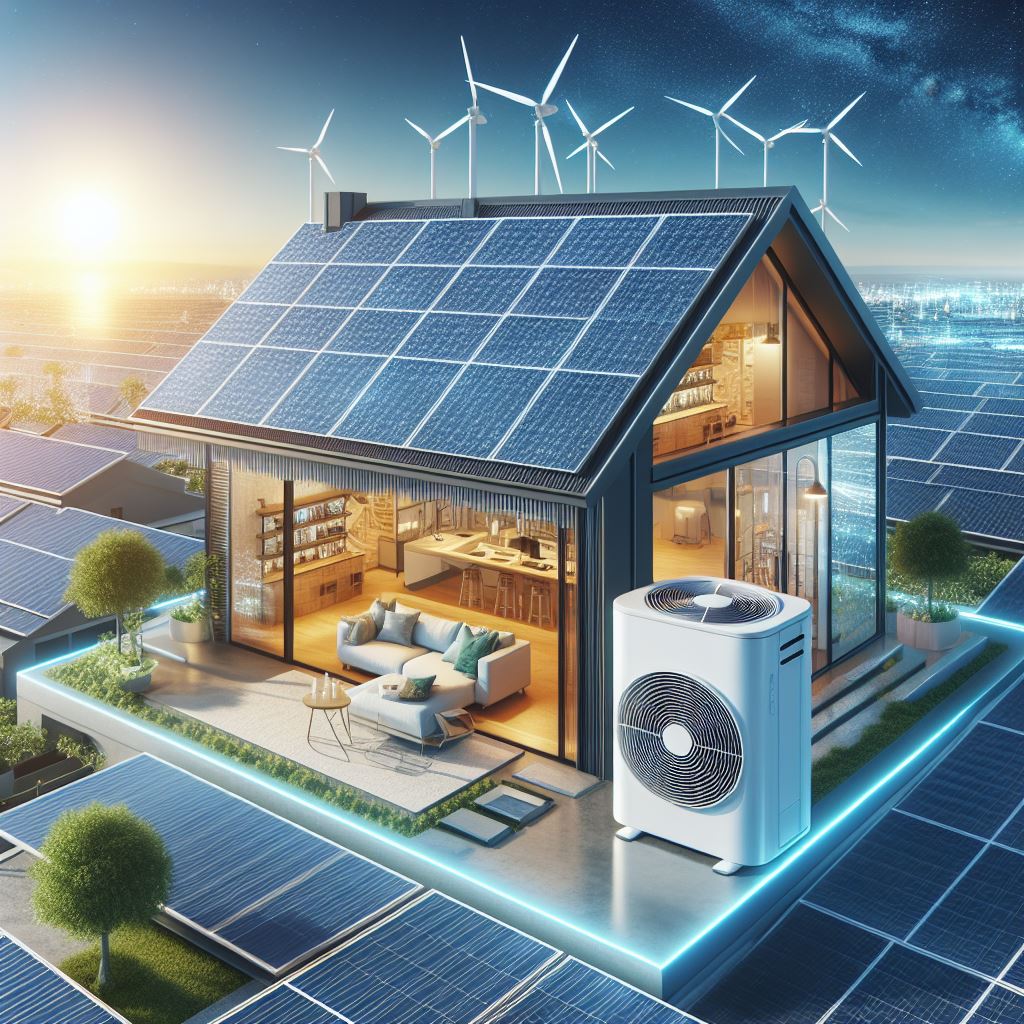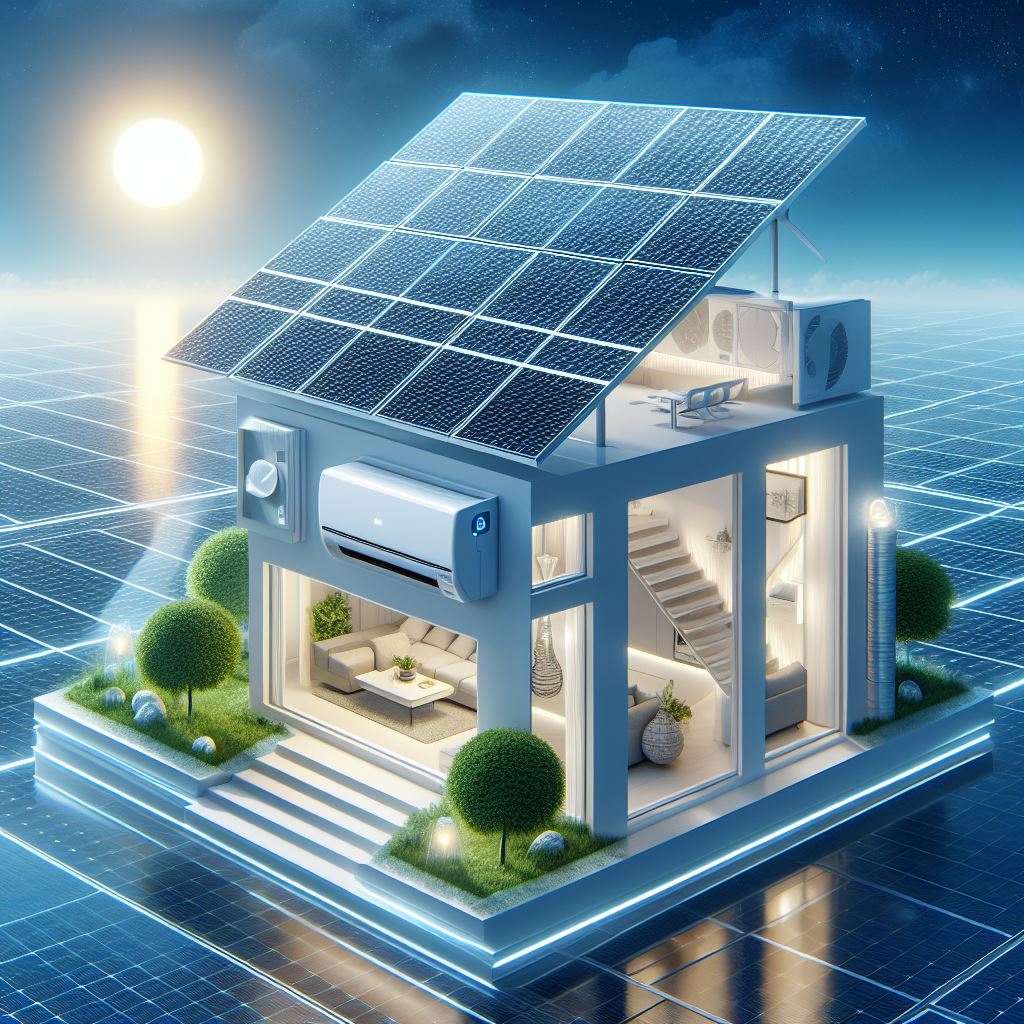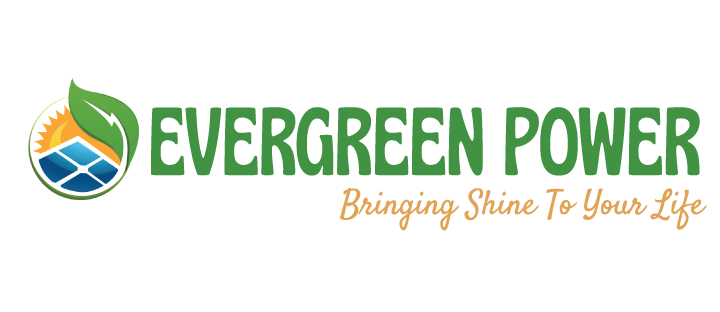Unleash the power of the sun to cool your home sustainably! This in-depth guide dives deep into calculating the number of Solar Panels for Your 1 Ton AC, considering factors like AC wattage, sunlight availability, panel efficiency, and desired usage patterns. Learn how to design a solar system that keeps you cool and reduces your carbon footprint!
The desire to live a more sustainable lifestyle and lessen your dependence on the traditional grid for your home’s cooling needs is a commendable goal. If you’re looking to harness the sun’s power to operate your trusty 1-ton AC unit, this comprehensive guide will equip you with the knowledge to determine the ideal solar panel setup for your eco-friendly cooling journey.
Solar Panels for Your 1 Ton AC Power Consumption
Before embarking on your solar panel adventure, it’s crucial to understand how much energy your 1-ton AC unit consumes. Generally, a 1-ton AC operates within a range of 1200 to 1500 watts. However, this value can fluctuate depending on several key factors:
- AC Efficiency Rating: The Seasonal Energy Efficiency Ratio (SEER) is a metric that indicates an AC unit’s cooling efficiency. A higher SEER rating signifies a more efficient AC, translating to lower wattage consumption. For instance, a 1-ton AC with a SEER rating of 18 might use around 1200 watts, while a less efficient unit with a SEER of 13 might require 1500 watts or more for the same cooling output.
- Inverter vs. Non-Inverter AC Technology: Inverter ACs are renowned for their superior efficiency compared to traditional non-inverter models. Non-inverter ACs operate at a fixed speed, cycling on and off to maintain the desired temperature. This process can lead to energy spikes and inefficiencies. Inverter ACs, on the other hand, can adjust their operation speed to match cooling demands, resulting in smoother operation and lower overall energy consumption.

Pro-Tip: Unearthing the specific wattage rating of your AC unit is as easy as consulting your AC unit’s manual or the manufacturer’s website. With this crucial information in hand, you’re well on your way to calculating the optimal number of solar panels for your needs.
Unveiling the Math Behind Solar Panel Quantity: Calculating for Sustainable Cooling
Once you’ve identified your AC’s wattage, you can embark on the exciting journey of calculating the number of solar panels needed to power it. Here’s the fundamental formula that will guide you:
Number of Solar Panels = Total AC Wattage / Solar Panel Wattage (per panel)
For example, let’s imagine your AC unit consumes 1400 watts, and you’re considering 300-watt solar panels. Plugging these values into the formula, we get:
Number of Panels = 1400 watts / 300 watts/panel = 4.67 panels
Since you can’t install fractions of panels, it’s essential to round up to the nearest whole number. In this scenario, you would require 5 solar panels to generate enough power to run your 1-ton AC unit.
How Many Solar Panels Do You Need to Power Your AC?
The number of solar panels required to run your air conditioner depends on its capacity and the output of the solar panels you have. Let’s delve into the specifics for different sizes of air conditioners, assuming an average usage of 4 hours per day.
Solar Panels for Your 1 Ton AC
If you’re eyeing to power a 1-ton AC, you first need to ascertain its power consumption. Typically, a 1-ton AC consumes around 1200 to 1500 watts of electricity. To generate this electricity, you’d require approximately 6 solar panels, each with a capacity of 250 watts.
However, if you plan to power other appliances alongside your AC using solar energy, you’d need additional solar panels depending on their power consumption.
For a 1.5 Ton AC
A 1.5-ton AC typically consumes around 2500 watts of electricity. To match this consumption, you’d need 10 solar panels, each rated at 250 watts. Additionally, if you intend to incorporate an inverter, a 2.5 kVA grid inverter would be necessary.
If you already have 10 solar panels installed for other electrical needs, you’d need another set of 10 panels to solely power the 1.5-ton AC.
For a 3 Ton AC
With a 3-ton AC, the average electricity consumption ranges from 3000 to 3500 watts. To meet this demand, you’d require approximately 14 solar panels, each with a capacity of 250 watts, exclusively for running the AC.
However, it’s advisable not to solely rely on solar panels for a 3-ton AC, as they may not consistently generate enough power. Having grid-wired electricity as a backup during low sunlight periods is prudent.
Battery Requirements for Nighttime Usage
Solar panels provide energy during the day, but for nighttime usage or cloudy days, batteries are indispensable for storing solar power. The battery capacity required depends on the AC’s wattage, with higher-capacity batteries necessary for larger AC units.

Benefits of Solar-Powered ACs
Embracing solar energy for your AC offers numerous advantages beyond mere cost savings:
- Reduced Electricity Bills: While not eliminating your bill, solar panels substantially reduce energy costs over the long term.
- Reliability During Power Outages: Solar-powered ACs provide a reliable alternative during frequent power cuts, ensuring uninterrupted cooling.
- Lower Maintenance Costs: Solar-powered ACs, managed by inverters, require less maintenance compared to traditional grid-powered units.
- Environmentally Friendly: Harnessing solar energy reduces reliance on fossil fuels, contributing to a cleaner and more sustainable environment.
Important Note: This calculation provides a simplified starting point and doesn’t account for several crucial factors that can influence the actual number of panels needed:
- Sunlight Hours: The amount of sunlight your location receives significantly impacts the amount of solar power your system can generate. Areas with fewer daily sunlight hours might necessitate additional panels to compensate for the reduced generation potential. Solar irradiance maps can be a valuable resource for researching your area’s average daily sunlight hours.
- System Losses: Unavoidable factors like inverter efficiency and wiring losses can cause a slight reduction in the overall power output from your solar panels. When sizing your system, it’s essential to factor in these losses to ensure your system generates enough power to meet your AC’s needs.
- Desired Usage: If you plan on running your AC for extended periods throughout the day, it’s wise to consider adding more panels to your system. This surplus power generation capacity can ensure your AC continues to operate smoothly even during peak usage times.
Beyond the Basics: Factors for a Fine-Tuned Solar Panel Estimation
For a more precise calculation tailored to your specific needs, consider incorporating these additional factors into your planning process:
- Your Location’s Average Daily Sunlight Hours: As mentioned earlier, sunlight availability is a critical factor. Researching your area’s average daily sunlight hours through online solar irradiance maps will provide valuable data to accurately estimate your system’s potential power generation.
- Desired Level of Solar Coverage: Do you envision your solar system completely powering your AC unit, eliminating reliance on the grid? Or are you comfortable with occasional grid backup during peak usage times? Determining your desired level of solar coverage will influence the number of panels needed.
- Solar Panel Efficiency: Solar panel efficiency refers to the percentage of sunlight a panel can convert into usable electricity. Higher-efficiency panels can generate more power with fewer panels, potentially reducing your system’s overall footprint and cost.
Consulting a Solar Installation Professional:
For the most accurate assessment and system design, consulting a qualified solar installer is highly recommended. These experts possess the experience and knowledge to meticulously evaluate your specific situation, including:
- Your Location: Factors like local climate, sun exposure patterns, and shading considerations will be taken into account.
- AC Usage Patterns: Understanding your typical AC usage habits is crucial for designing a system that meets your cooling demands.
- Budget: Solar installers can help you design a system that aligns with your budgetary constraints while maximizing efficiency and sustainability benefits.
Through this collaborative approach, you can ensure your solar panel system is perfectly tailored to your 1-ton AC’s needs, your location’s unique characteristics, and your budget.
Battery requirements for running AC at night
Running an air conditioner at night using solar power is an innovative solution, but it’s crucial to consider battery requirements for uninterrupted operation, especially during periods of low sunlight or cloudy weather.
Solar panels are efficient during the day, but without sunlight, they can’t produce electricity. That’s where batteries come into play. They store the solar energy generated during the day, ensuring a continuous power supply for running the air conditioner at night.
However, it’s not a one-size-fits-all scenario. The capacity of the battery depends on the wattage of the air conditioner. Using a high-capacity battery for a low-power air conditioner would be inefficient. In such cases, an inverter can help optimize battery usage by sharing the load.
For instance, a 1.5-ton air conditioner typically requires four batteries of 150 ampere-hours (AH) to sustain operation for three to four hours. This setup ensures the smooth functioning of the AC without any interruptions. However, if the air conditioner needs to run for an extended period, additional batteries may be necessary to meet the energy demand.
Therefore, it’s essential to assess your AC usage pattern and select the appropriate battery configuration to ensure a reliable power supply throughout the night. By understanding your energy needs and optimizing battery usage, you can enjoy the comfort of air conditioning even when the sun goes down.

FAQs about Solar Panels for Your 1 Ton AC
Can a 1-ton AC be entirely powered by solar panels?
Absolutely! However, achieving complete solar coverage depends on several factors your location’s sunlight hours, your AC unit’s efficiency, and your desired usage patterns. A well-designed solar system with sufficient panels has the potential to completely power your 1-ton AC unit, reducing your reliance on the grid and shrinking your carbon footprint.
What size inverter do I need for a 1-ton AC solar system?
The inverter in your solar system is responsible for converting the direct current (DC) electricity generated by your solar panels into usable alternating current (AC) electricity that powers your appliances. When selecting an inverter for your 1-ton AC system, it’s wise to choose one with a capacity slightly exceeding your AC unit’s peak wattage rating. For a 1-ton AC that consumes around 1400 watts, a 2kW inverter would be a suitable starting point. Consulting with a solar installer can help you determine the optimal inverter size for your specific needs.
How much does a solar panel system for a 1-ton AC cost?
The cost of a solar panel system for your 1-ton AC can vary depending on several factors, including:
Location: Labor costs and permit fees can differ based on your region.
Equipment Quality: The quality and brand of solar panels and inverters you choose will influence the overall system cost.
System Size: The number of panels required will directly impact the system’s total cost.
In general, a solar panel system for a 1-ton AC might range from $3,000 to $7,000. However, consulting with qualified solar installers in your area will provide you with the most accurate cost estimate based on your specific requirements.
Are there any government incentives for installing solar panels?
Many countries, states, and even local municipalities offer tax credits, rebates, or other financial incentives to encourage homeowners to adopt solar power. Researching the available incentives in your area can significantly enhance the financial viability of your solar panel system. These incentives can help offset the upfront cost of installation, making solar power a more attractive option.
How long does it take to recoup the cost of a solar panel system?
The payback period, or the time it takes for the energy cost savings from your solar system to offset the initial installation cost, depends on several factors such as:
System Cost: The total cost of your solar panel system will directly impact the payback period.
Electricity Rates: The higher your current electricity rates, the faster you’ll experience cost savings through solar power generation.
Available Incentives: Government incentives like tax credits can significantly shorten the payback period.
Typically, the payback period for a solar panel system can range from 5 to 10 years. Beyond the payback period, you’ll continue to enjoy years of free, clean energy generation from your solar panels.
Conclusion of Solar Panels for Your 1 Ton AC
Determining the optimal number of solar panels required to power a 1-ton AC unit involves careful consideration of various factors. By assessing energy consumption, panel efficiency, and environmental conditions, you can size your solar system effectively and enjoy sustainable, cost-effective cooling solutions for your home. Invest in renewable energy today and contribute to a greener future.
Visit our Site:
Welcome to EG Power Ltd – your go-to destination for solar solutions. With over five years of experience in solar and renewable energy, we’re dedicated to providing the most cost-effective panels on the market.
We prioritize environmental sensitivity and offer personalized solutions to meet your needs. Join us in saving the planet – contact us today!
Phone: 0300 1819060
Email: info@egpowerltd.com
